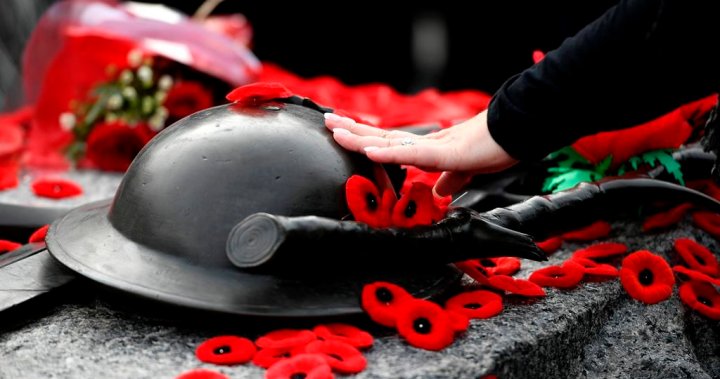I'll believe it when I see it.
You are using an out of date browser. It may not display this or other websites correctly.
You should upgrade or use an alternative browser.
You should upgrade or use an alternative browser.
Justin Trudeau hints at boosting Canada’s military spending
- Thread starter Maxman1
- Start date
- Reaction score
- 9,761
- Points
- 1,360
If a senior leader at my Company talked like that BGen did given the current state of the CAF....they'd be shown the door.There is such a thing as toxic positivity.
When you gloss over the massive problem by pointing out the multitude of microscopic wins, you're avoiding the problem by saying "Yes, but look at how good this one minute little thing is! Isn’t that great?"
No "positive thinking" exercise will paper over the very real and critical problems facing the CAF.
- Reaction score
- 18,271
- Points
- 1,280
Yes, but the military isn’t (and shouldn’t be) structured like a private company.If a senior leader at my Company talked like that BGen did given the current state of the CAF....they'd be shown the door.
daftandbarmy
Army.ca Dinosaur
- Reaction score
- 31,756
- Points
- 1,160
If a senior leader at my Company talked like that BGen did given the current state of the CAF....they'd be shown the door.
Well, the key point is that anyone who talks like that wouldn't even make it into the senior ranks in your company, and most others.
In the CAF 'Happy Talk' vs. 'Hard Talk' seems to have become a pre-requisite
Whether you’re the leader of a company or a country, the problem with Happy Talk is that you can’t get out of a crisis until you admit you’re in one. Once you admit it, you can fix it. If you try to sugarcoat it, you can’t explain why people need to take the tough steps and make sacrifices. Trying to make people feel better by under-selling the problem or over-selling personal assurances never works. It just makes the team feel worse. Leaders only make people feel better by clearly stating the problem, providing a credible plan for winning, and getting the team’s buy-in for that plan.

Happy Talk versus Hard Talk
On Friday President Trump declared a national emergency. The market shot up 10% in a relief rally. Why would people be relieved that there…
 medium.com
medium.com
TacticalTea
Army.ca Veteran
- Reaction score
- 1,485
- Points
- 1,160
Why not.Yes, but the military isn’t (and shouldn’t be) structured like a private company.
Why not, you... (American Psycho reference)*
More specifically, why should we foster a culture where Generals encourage others to lie? Isn't that a great recipe for operational disaster? Aren't we setting ourselves on the path to tyranny when we readily accept the lie?
I don't think we can get away with glaring organizational issues by just saying "welp, tis ain't no private business!" and carrying merrily along.
(*:not meant personally, I just think it's a funny reference)
- Reaction score
- 18,271
- Points
- 1,280
I’m not saying that Generals should encourage others to lie. What I’m saying is that the military shouldn’t be structured like a private company, where profit (and shareholder happiness) is priority #1.Why not.
Why not, you... (American Psycho reference)*
More specifically, why should we foster a culture where Generals encourage others to lie? Isn't that a great recipe for operational disaster? Aren't we setting ourselves on the path to tyranny when we readily accept the lie?
I don't think we can get away with glaring organizational issues by just saying "welp, tis ain't not private business!" and carrying merrily along.
(*:not meant personally, I just think it's a funny reference)
Private companies would do “just in time” logistics because it saves money. We want stores in case things go south.
daftandbarmy
Army.ca Dinosaur
- Reaction score
- 31,756
- Points
- 1,160
Why not.
Why not, you... (American Psycho reference)*
More specifically, why should we foster a culture where Generals encourage others to lie? Isn't that a great recipe for operational disaster? Aren't we setting ourselves on the path to tyranny when we readily accept the lie?
I don't think we can get away with glaring organizational issues by just saying "welp, tis ain't no private business!" and carrying merrily along.
(*:not meant personally, I just think it's a funny reference)
At least Bill Blair seems to be leading by example through calling out the big problem of the moment...

Canada’s military facing ‘death spiral’ on recruitment, minister says - National | Globalnews.ca
The federal government is “constrained” on more defence spending given the “current fiscal environment,” Defence Minister Bill Blair says.
And the CDS too....

Defence chief ‘very concerned’ about readiness against growing threats - National | Globalnews.ca
Gen. Wayne Eyre spoke with Global News amid commemorations for the national Remembrance Day ceremony in Ottawa about the military's readiness and emerging threats.
Last edited:
- Reaction score
- 9,761
- Points
- 1,360
We do "Just in time" logistics and our VOR rate is WAY better than the CAFs. The CAF needs a wholesale teardown and redesign. I would personally cut the Reg Force down by about 20,000+ people and mothball all of the antiquated equipment for a start.I’m not saying that Generals should encourage others to lie. What I’m saying is that the military shouldn’t be structured like a private company, where profit (and shareholder happiness) is priority #1.
Private companies would do “just in time” logistics because it saves money. We want stores in case things go south.
- Reaction score
- 7,024
- Points
- 1,310
"You cannot change what you fail to acknowledge; and what you fail to acknowledge will only get worse until you do." - Rule #1 of the RSM's 3; taught to me some 17 years ago.
There are far too many people within CAF, Government, and private industry that need this stapled to their forehead.
You can preach positivity, "they aren't problems, they're opportunities...", or "come to me with your solutions".... any multitude of managerial drivel preached on any MBA or JCSP. Until you are ready to acknowledge how bad things are, you are grossly ignorant of what the potential solutions should be.
I mean every word of it when I tell my soldiers that "things are awful, but we still have a job to do. We need to support our people , with what we have available, and hope for the best. This will pass; it may pass like a kidney stone, but it will pass. Hang in there."
There are far too many people within CAF, Government, and private industry that need this stapled to their forehead.
You can preach positivity, "they aren't problems, they're opportunities...", or "come to me with your solutions".... any multitude of managerial drivel preached on any MBA or JCSP. Until you are ready to acknowledge how bad things are, you are grossly ignorant of what the potential solutions should be.
I mean every word of it when I tell my soldiers that "things are awful, but we still have a job to do. We need to support our people , with what we have available, and hope for the best. This will pass; it may pass like a kidney stone, but it will pass. Hang in there."
- Reaction score
- 1,929
- Points
- 1,160
This fellow concludes that with 2% funding, the CAF could just barely equip to meet its on paper force requirements, but the military would not be able to recruit, train, retain a force of 100,000 fit for fighting duty, (and probably never will be able to IMO).
- Reaction score
- 18,271
- Points
- 1,280
Yes, when supplies flow. What if it doesn’t?We do "Just in time" logistics and our VOR rate is WAY better than the CAFs. The CAF needs a wholesale teardown and redesign. I would personally cut the Reg Force down by about 20,000+ people and mothball all of the antiquated equipment for a start.
To be fair, I think JIT works for a business. But the last few years have shown that maybe JIT doesn’t work for stuff like 155mm, and other military needs.
Halifax Tar
Army.ca Fixture
- Reaction score
- 11,132
- Points
- 1,260
If it came to conflict, the NAVRes to my understanding i in a better position compared to the ARes. I don't know how many ships we could crew out but I imagine a few
NAVRES is designed to produce individual augmentation. The NRDs are not themselves mobile or deployable. They are essentially little RCN attractions and recruiting stations all over the country.
2 days ago, I was told by a Bgen that stating obvious problems was showing bad attitude, we need to have a positive mind set…. The issues is more then money.
That BGen is part of the problem.
Yes, when supplies flow. What if it doesn’t?
To be fair, I think JIT works for a business. But the last few years have shown that maybe JIT doesn’t work for stuff like 155mm, and other military needs.
JIT doesn't work for us. Again we need warehouses strategically located and filled to the brim with stock, for just in case. That's bad business but its good military logistics.
ArmyRick
Army.ca Veteran
- Reaction score
- 2,326
- Points
- 1,010
Unless your a business that sucks off the teat of this generous government, here is the key rule in Business.I’m not saying that Generals should encourage others to lie. What I’m saying is that the military shouldn’t be structured like a private company, where profit (and shareholder happiness) is priority #1.
Private companies would do “just in time” logistics because it saves money. We want stores in case things go south.
Your effective or your done. No ifs, ands or buts.
You treat employees like shit, it will cost you
You don't manage funds properly, you go bankrupt
You don't acknowledge real problems or root causes, you go down.
markppcli
Army.ca Veteran
- Reaction score
- 6,055
- Points
- 1,260
I’d love to know where you think we have 20,000 surplus bodies. The Navy and Air Force can barely function at present manning, and the Army has maybe 15000 in the Field Force.We do "Just in time" logistics and our VOR rate is WAY better than the CAFs. The CAF needs a wholesale teardown and redesign. I would personally cut the Reg Force down by about 20,000+ people and mothball all of the antiquated equipment for a start.
- Reaction score
- 21,601
- Points
- 1,260
I suspect he’s wiling to cut across the board to make a leaner and meaner force.I’d love to know where you think we have 20,000 surplus bodies. The Navy and Air Force can barely function at present manning, and the Army has maybe 15000 in the Field Force.
Maybe the Army could get by with 1 CMBG, 1 CLBG, and 1 CSSB? As well as parsing the other services as well.
- Reaction score
- 9,761
- Points
- 1,360
Yes, but the military isn’t (and shouldn’t be) structured like a private company.
Never said it would operate like one. The CAF seems to take all the wrong lessons from Organizational Behaviors, Business Schools, etc though.
Ammunition wouldn't be JIT in my business, that would be like saying fuel or parts for cars should be delivered JIT. Ammunition is a consumable and should be treated as such.Yes, when supplies flow. What if it doesn’t?
To be fair, I think JIT works for a business. But the last few years have shown that maybe JIT doesn’t work for stuff like 155mm, and other military needs.
One of the problems with the CAF is what they allocate their funds towards:
The CAF is too large for its funding envelope and it has too many layers of superfluous bureaucracy. To be frank, they need to make deep cuts to their management structure, divest excess infrastructure and antiquated equipment which is becoming increasingly expensive to operate and reinvest in leaner and meaner Military.
NAVRES is designed to produce individual augmentation. The NRDs are not themselves mobile or deployable. They are essentially little RCN attractions and recruiting stations all over the country.
That BGen is part of the problem.
I think @daftandbarmy hit the nail on the head with their comment on "Happy Talk vs Hard Talk".
Current CAF Culture is a large part of the problem and if I had to assess the Leadership style and current institutional trends, it would probably straddle between Avoider/Accommodator on the chart below:

This isn't to say there aren't strong individual leaders as there most certainly are. I don't believe the institution cultivates a strong leadership culture and it certainly doesn't value getting things done.
Sad fall from grace for an organization that used to pride itself on its ability to develop leaders.
I agree with this, the problem is the CAF does neither JIT or Stockpiling, and if it does, it does it poorly. The truth is no business that wants to be successful does purely JIT logistics.JIT doesn't work for us. Again we need warehouses strategically located and filled to the brim with stock, for just in case. That's bad business but its good military lologistics.
We are selective on what we use JIT for. We use it for Locomotives because it makes no sense to have more Locomotives running than you actually need to run your operation. These are $million+ dollar assets and having a bunch sit idle burning fuel as an added expense line is bad business.
We do keep a small Reserve for emergencies but we keep 95% of them constantly moving. As such, we have a robust maintenance and inspection cycle to keep them operational with information that is fed in real-time to our fleet management team.
One of my Locomotives broke last week. It was lifted within 12 hours and sent to the Shops for repair within 6 hours and I had a replacement 2 days later that traveled halfway across the Country to get to me.
Car parts are something that we do keep a large stock of. Bearings, hoses, valves, knuckles, etc will break from wear and tear frequently and we generally have them repaired within a day to keep product moving to customers. This is easy to maintain because we use common & standardized parts for all our cars that are interchangeable, no matter the car or commodity being transported.
- Reaction score
- 355
- Points
- 780
Umm yeah, however basic leadership principles apply in both.Yes, but the military isn’t (and shouldn’t be) structured like a private company.
OldSolduer
Army.ca Relic
- Reaction score
- 15,276
- Points
- 1,260
It used to be Danger but….Sarcasm is my middle name.....
markppcli
Army.ca Veteran
- Reaction score
- 6,055
- Points
- 1,260
I suspect he’s wiling to cut across the board to make a leaner and meaner force.
Maybe the Army could get by with 1 CMBG, 1 CLBG, and 1 CSSB? As well as parsing the other services as well.
The Canadian Army is something around 44000, with 20000 reservists. How you eliminate 20000 full time positions from that and keep three Bdes would be an interesting numbers game.
TacticalTea
Army.ca Veteran
- Reaction score
- 1,485
- Points
- 1,160
That's what gets you in trouble in the CAF.it certainly doesn't value getting things done.
- Reaction score
- 21,601
- Points
- 1,260
I don’t think he’s talking just about the Army.The Canadian Army is something around 44000, with 20000 reservists. How you eliminate 20000 full time positions from that and keep three Bdes would be an interesting numbers game.
Similar threads
- Article
- Replies
- 546
- Views
- 227K
- Replies
- 28
- Views
- 13K
- Replies
- 3
- Views
- 3K
- Replies
- 34
- Views
- 12K
- Replies
- 294
- Views
- 51K


